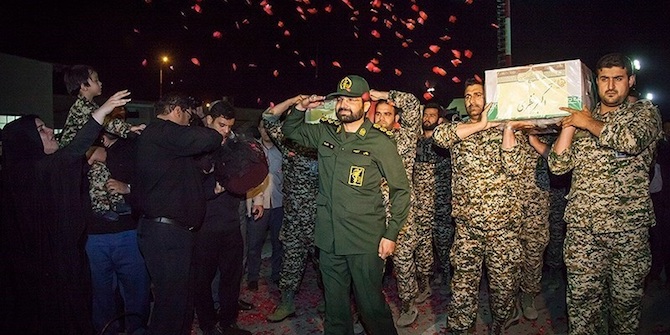by Vuk Vuksanovic

Shortly after the Barcelona attacks which killed 15 people and injuring at least a hundred, ISIS claimed responsibility for what is yet another episode in the string of terror hitting Europe in the past two years. Spanish police later killed five suspected terrorists and arrested other suspected perpetrators. Even after losing its biggest stronghold in Iraq, the city of Mosul, and while defending its capital Raqqa in Syria, ISIS has proven to still be a major threat, rebranded as what the head of intelligence in Iraqi Kurdistan, Lahur Talabany called ‘Al Qaeda on steroids’. Having suffered significant loss of territory, ISIS now needs to resort back to traditional terrorist operations of its Al Qaeda predecessor to still be relevant in the world of global Jihad. If ISIS can no longer a run large caliphate, it can retain its importance through spreading fear by launching and inspiring acts of terror internationally, with unpredictability and frequency never associated with Al Qaeda.
The reason why ISIS became such a global phenomenon over the past three years, is the fact that it is not a typical terrorist organisation. Instead of being a transnational web-based non-state actor, ISIS emerged as a pseudo-state, with its own army, administrative and physical infrastructure and even a legislation. An additional factor that made ISIS such a menacing phenomenon resembling an actual state, was the growth of its own economy. At one point, ISIS generated a monthly revenue of $50 million from oil sales, and had an elaborate taxation system on commercial activities conducted on its territory, such as telecommunication services. ISIS could then have proudly considered itself the first terrorist group to build a state, having seized a vacuum left by state breakdown in Iraq and Syria, and having been able to attract foreign and recruit Sunni fighters, disenfranchised by the Shia-dominated Iraqi government, while offering those living in its domain a sense of citizenship.
Nevertheless, ISIS is past its prime as a territory-holding actor. Although Talabany, when he using the term ‘Al Qaeda on steroids’ meant that ISIS would return to the intensified insurgency of its predecessor in Iraq instead of acts of terror on foreign soil, his description was accurate in terms of threat level. In order to compensate for the loss of territory, ISIS will continue to conduct and inspire attacks worldwide, if it wants to remain a globally relevant actor. In that context, ISIS was forced to adopt the strategy of ‘the far enemy’ associated with Al Qaeda. Unlike Al Qaeda, ISIS was not initially focused on waging the global Jihad and was more interested in running its caliphate. While traditional Jihadi groups were primarily focused on bringing down the ‘near enemy’, meaning Arab regimes, ranging from conservative Arab monarchies, followed by Egypt’s military regime, all the way to regimes in Iraq and Syria, Al Qaeda decided to strike at the far enemies – the US and Israel – in order to provoke a violent reaction that would generate chaos. The Barcelona attacks are just the latest in the string of ‘far enemy attacks’, and one can expect that they will not be the last.
There are several ways in which ISIS will be a threat in the future. Firstly, there is the issue of foreign fighters returning to their home countries. This fear is present worldwide, in the UK, the Balkans, all the way to Russia and China. With ISIS’s opt-in and opt-out way of functioning, one can join the organisation, becoming radicalised and more violent, before returning to their home country.
Secondly, ISIS has replaced Al Qaeda as the dominant brand in the world of global Jihadists. In the past, Al Qaeda acted as a sophisticated network and for many local Jihadi organisations it was enough to label themselves as an ally or a branch of Al Qaeda in order to seem more menacing and relevant. By contrast, the emphasis for ISIS is on quantity and not quality and one needs not display ideological or operational sophistication in order to be embraced by it. This is true of the Nigerian Boko Haram that pledged allegiance to ISIS; all the way to the presence of ISIS fighters and allies in the various locations of Libya, Afghanistan, Indonesia and the Philippines.
Ultimately, where ISIS has proven most deadly was in its ability to inspire the so-called ‘lone wolf attacks’, carried out across Europe, frequently by people born in the target countries, rather than by first generation immigrants. This means that ISIS is able to draw on the frustration felt by Muslim population of the West who feel anxious and frustrated for their marginal social position and their alienation . In that regard, ISIS can both directly orchestrate a ‘lone wolf attack’ or it can simply claim responsibility for the attack it never premeditated in order to gain additional notoriety, and further its agenda of spreading fear and insecurity. ISIS is even more dangerous in a world where committing acts of terror no longer require significant funding. As Peter Neumann observed, the cost of terrorist attacks committed in Europe in 2016 and 2017, did not exceed USD 300 per attack. This makes it more complicated for intelligence services and law enforcement agencies to detect and prevent potential terrorist attacks as it will be more difficult to identify threats posed by lone individuals with limited resources rather than more established groups and networks.
ISIS has truly become ‘Al Qaeda on steroids’. Although it lacks sophistication and organisation, it has proven that it can commit acts of terror with frequency and unpredictability that Al Qaeda never possessed.






